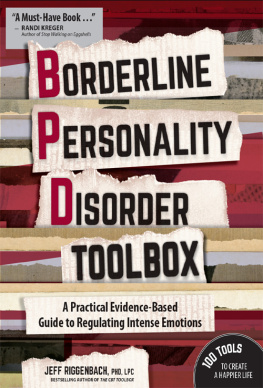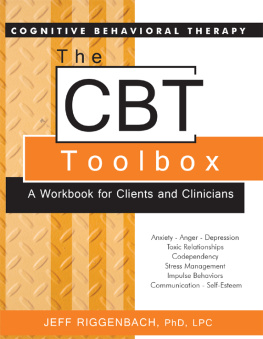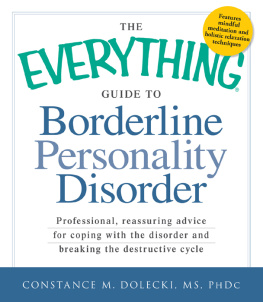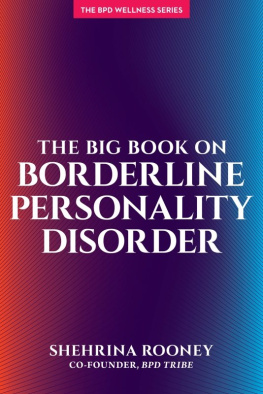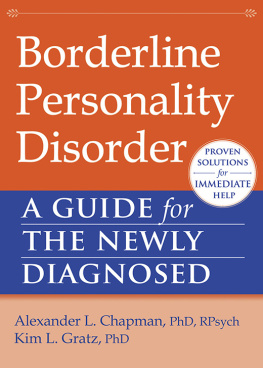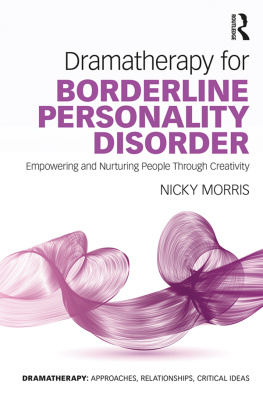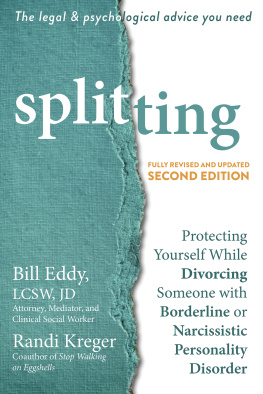B ORDERLINE
P ERSONALITY
D ISORDER
TOOLBOX
A Practical Evidence-Based Guide to Regulating Intense Emotions
JEFF RIGGENBACH, PHD, LPC
BESTSELLING AUTHOR OF THE CBT TOOLBOX
Many people who struggle to acknowledge the presence of BPD traits in their lives continue to suffer needlessly. In the Borderline Personality Disorder Toolbox, Dr. Jeff Riggenbach explains this diagnosis clearly and offers a variety of skills from evidence -based approaches for treating it. This toolbox is a must-have for mental health professionals, people with BPD traits, and their family members.
-Randi Kreger,
Author, Stop Walking on Eggshells and The Official Family Guide to Borderline Personality Disorder
Founder, BPDCentral.com
Written in clear user-friendly language, and drawing on vast research literature, beautifully summarizes what is known about BPD and how it can be effectively treated. Comprehensive in approach, it is an excellent resource for patients, clinicians, and families.
-Joel Paris, MD,
Author, Treatment of Borderline Personality Disorder: A Guide to Evidence-Based Practice
Editor, Canadian Journal of Psychiatry
Borderline Personality Disorder ToolBox is a must-have comprehensive guide to understanding and managing BPD. Dr. Riggenbachs step-by-step accessible strategies will help the reader obtain empirically valid powerful tools to cope with Borderline Personality. This uniquely helpful guide will be an essential resource for both clients and their clinicians alike.
-Leslie Sokol, PhD
Distinguished Founding Fellow,
Academy of Cognitive Therapy, Fellow, ABCT
Co-author, The Think Confident, Be Confident Workbook for Teens
Being asked to see a patient who has been diagnosed as having a Borderline Personality Disorder is enough to frighten even the most skilled and experienced clinician. Following Aaron T. Becks notion of the Continuity Continuum, Riggenbach describes and discusses the recommended treatments for various levels of Borderline, from mild to severe. This is a volume for every front-line therapist regardless of their professional discipline.
-Arthur Freeman, EdD, ScD, ABPP
Co-Author with Aaron Beck, Cognitive Therapy of Personality Disorders
Chair, Department of Behavioral Science, Touro College, NY
Copyright 2016 by Jeff Riggenbach
Published by
PESI Publishing & Media
PESI, Inc
3839 White Ave
Eau Claire, WI 54703
Cover: Amy Rubenzer
Editing: Marietta Whittlesey
Layout: Bookmasters & Amy Rubenzer
ISBN: 9781683730057
All rights reserved.
Printed in the United States of America.



Dr. Riggenbach is one of the most sought-after trainers and a recognized expert in the area of personality disorders. Over the past 15 years he has developed and directed CBT/DBT based Borderline Personality Disorder treatment programs at two different psychiatric hospitals serving over 500 clients with BPD. Over the past 10 years, he has trained more than 10,000 mental health professionals in various personality disorders seminars and CBT conferences. He also coaches people with BPD in non-clinical settings as well.
Dr. Riggenbach trained at the Beck Institute of Cognitive Therapy and Research in Philadelphia, is a Diplomate of the Academy of Cognitive Therapy, and is an international trainer on topics related to CBT, DBT and Personality Dysfunction.
His first book, The CBT Toolbox: A Workbook for Clients and Clinicians has been extremely well received and is being used in graduate programs as well as by mental health professionals and lay people alike. Dr. Riggenbach is known for bridging the gap between academia, research findings and day-to-day clinical practice, both in his workshops and writings.

How is it that if Borderline Personality Disorder supposedly only affects 3% of the population that we always seem to find each other?
Liz, an attractive, articulate 26-year-old asked me as she sat down in my office one day. What do you mean? I replied, knowing exactly where she was headed but awaiting the details anyway. She continued, Last week, my friend Lindsay introduced me to a man named Eric. In the beginning, I was not attracted to him at all. After all, he was 20 years older than me, but the more time I spent with him that first evening, I increasingly felt like Id known him my whole life.
Our first date went so well that I called him back the next day and invited him over to cook dinner for him that night. I made us my variation of taco salad. The food proved delicious, and the meal was wonderful, in part because we shared fun, intellectually provocative conversation. We had a minor food fight and even took turns feeding each other. Dinner was playtime, as if we were children. Afterwards, I carried away our dishes and proceeded to wash them, cleaning up our food fight mess in between sinks full, subsequently returning to watch our first movie of the night, Stars Wars.
Sounds like a fun evening, I said.
Wait, it got even better, she continued.
As we watched the movie, Eric narrated in his radio voice persona, reliving his days as a disc jockey. I relished it. He had that quick wit that I fall for every time.
It did get better. It sounds like you were having fun, I added.
Until it got worse, she replied.
He started out hilarious, but suddenly, he chose a dramatic, vulgar tone that made me uncomfortable and triggered my consciousness to quickly change. As I momentarily withdrew, he grew angrier and angrier so that he was enraged by the time my awareness returned. It happened so quickly, that I didnt even realize what had happened. In order to calm him down, I quickly initiated the one thing I knew would calm him: sex. Impulsive, guilt-laden, self-denigrating sex. Its always been my number one go-to to pacify guys.
When it was over, he was crying over me, sobbing, begging me not to leave him, lavishing promises of change, excessive apologies and desperate pleas of me to forgive him and not leave him alone again as previous women had done. He felt bad for guilting me, and I felt responsible for the entire nights difficulties. He was afraid, and I, I was a self-loathing disaster. I followed his lead and apologized profusely as well. Afterwards, we hugged, made up, and decided to take a walk.
As we walked in the crisp, fall night air, the tension now broken, the joking resumed. We walked briskly for about two hours, gaily bantering between ourselves, although I thought he enjoyed our time far more than I. The blaming, critical thoughts constantly running in the back of my mind prevented me from enjoying the fullness of our conversation and relaxing walk. As our time together concluded for the night, those same thoughts waged a war inside my mind. Liz paused a moment to breathe and steady herself for the remainder of her confession.

